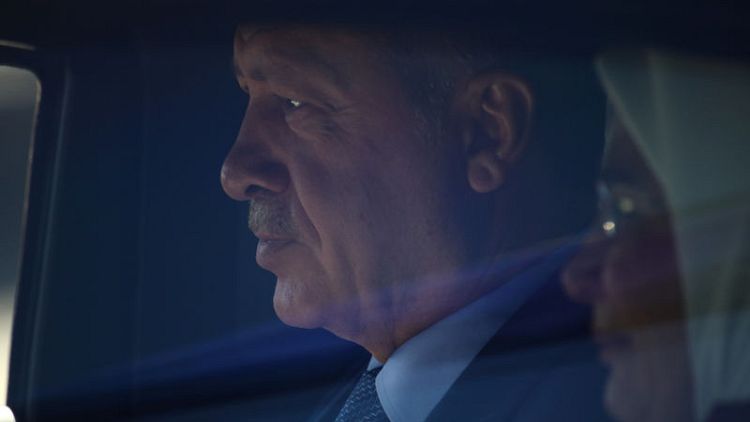By Thomas Escritt
BERLIN (Reuters) - Turkish President Tayyip Erdogan urged Germany on Thursday to designate the group that he blames for a 2016 coup attempt as a terrorist organisation.
His call, in a newspaper article as he arrived for a three-day state visit, highlighted the gulf Erdogan must bridge if he is to repair strained political and commercial ties.
Germany has so far said it needs more proof to link the movement of the Muslim cleric Fethullah Gulen, who lives in the United States, to the attempt to overthrow Erdogan.
And as Erdogan was whisked through a locked-down city to his hotel by the Brandenburg Gate, allegations that a Berlin police officer had been spying on exiled dissidents for Turkish security services highlighted the two sides' mutual mistrust.
Germany's refusal to extradite military officers whom Turkey accuses of participating in the coup attempt, after they claimed asylum, enraged Ankara. Berlin is concerned about the fate of tens of thousands of people imprisoned in the subsequent crackdown, who included dozens of German citizens.
But with Turkey's economy in crisis and Germany home to 3 million ethnic Turks and relying on Turkey to help contain a Syrian migrant crisis beyond Europe's borders, both sides want to put their differences aside.
"We are pursuing the goal of increasing our trade and economic ties," Erdogan wrote in an article for Germany's Frankfurter Allgemeine daily. "For the sake of prosperity and the future of both our countries, let us increase our mutual interests and reduce our problems."
Erdogan will meet Chancellor Angela Merkel three times during his state visit. But Berlin is wary of conceding too much, too fast.
"This visit isn't a sign of normalisation," Erdogan's host, President Frank-Walter Steinmeier, told the RND newspaper group. "But it could be the start of it. After the trauma of the 2016 coup attempt, we expect a return to the rule of law."
After years of breakneck growth, Turkey has seen its heavy foreign debt load increased by a lira slide of 40 percent this year - a sell-off that intensified after President Donald Trump imposed sanctions in retaliation for the detention of a U.S. pastor.
"SO IMPORTANT, SO DIFFICULT"
Hours before Erdogan landed, demonstrators gathered at the airport, protesting over the lack of press freedom in Turkey, where dozens of critical journalists are jailed. Others were waiting near his hotel.
"We have to talk to each other," junior foreign minister Michael Roth told German radio. "There can't be another country outside the European Union with whom relations are so important and yet so difficult."
Both sides have dismissed suggestions that Turkey could seek financial aid from Germany or the EU. But a rapprochement could unlock investment from German manufacturers who have been deterred by Turkey's recent volatility.
German authorities, also fret at Erdogan's influence over German Turks, and have warned him against campaigning overtly when he opens a mosque on Saturday in Cologne, home to one of Germany's largest Turkish communities.
Ankara plays close attention to its diaspora communities worldwide. Just how close became clear when Berlin police announced that an officer was suspected of reporting to the Turkish security services. The Tagesspiegel newspaper said he had leaked the address of a Berlin-based dissident.
"If the suspicions are confirmed, then not only was an oath of service broken, but a serious crime was committed ... the damage from which could not be undone," the police force tweeted.
Against that backdrop, Thursday's announcement that Germany had beaten out Turkey, another soccer-mad nation, to host the 2024 European championships will be the least of diplomats' concerns.
(Additional reporting by Reuters TV, Reuters photographers and Tassilo Hummel; Editing by Kevin Liffey)
